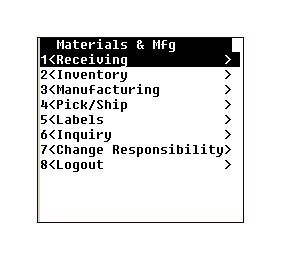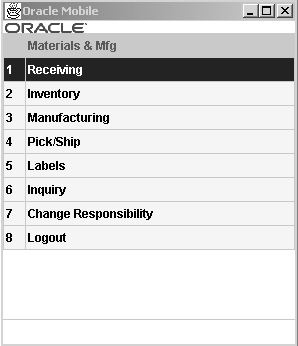Oracle Warehouse Management system is a component of Oracle's Supply Chain Management and Manufacturing solution. It spans the areas of warehouse resource management, warehouse configuration, task management, advanced pick methodologies, and value added services.
Oracle Warehouse Management supports both paper-based and automated environments with material handling systems and radio frequency (RF) hand-held computers. To optimize the order fulfillment process, Oracle Warehouse Management provides advanced distribution processes, such as value-added services, cross docking, order assembly postponement, and resource and task management.
Oracle Warehouse Management also provides an easy-to-use interface for mobile, wireless hand-held computers. Mobility, process automation, and bar code scanning greatly improve the efficiency of the Supply Chain Logistics business processes.
Key Functionality
Inbound Logistics
Includes receiving directly into inventory, receipt inspections, label printing, rules-based directed put away to storage or opportunistic cross docking
Storage and Facility Management
Oracle Warehouse Management extends intra-organization replenishments, container Management, storage Space optimization, cycle counting and physical Inventory, physical warehouse Mapping.
Value Added Services
Includes labeling, packing, kitting
Outbound Logistics
Includes picking, staging, packing, product consolidation, loading, and shipping
Reverse Logistics
Includes product returns, refurbishment, and recycling
Mobile User Interface
The following figures depict the mobile user interfaces.


Warehouse Configuration
Oracle Warehouse Management uses the same warehouse, resource, trading partner, and material configuration employed by the rest of the Oracle eBusiness Suite. These entities enable users to define inventory organizations, physical areas within the facility, and inventory locators, as well as material valuation cost groups–that are used to track inventory costs, departments within a facility, and the resources that perform warehouse tasks, such as material movement and value added services.
Container Management
Container management enables you to track the contents of any containers in receiving, inventory, shipping, and intransit inventories. The rules engine enables you to set up task strategies that optimize warehouse execution and management.
Using License Plate Numbers
Oracle Warehouse Management provides full visibility to inventory items that are stored in license plate numbers (LPNs). An LPN, in Oracle Warehouse Management, is any object that exists in a location and holds items. An LPN might be a container, but it does not need to represent a physical entity. It could be as simple as a label on a collection of items. Oracle Warehouse Management enables users to track, transact, and nest LPNs and their contents.
Cost Group Assignment
If your company holds inventory on their premises, you can use the cost group assignment feature to view the ownership associated with inventory. A separate cost group is warranted whenever an item has a different account coding. Thus, a supplier's warehouse inventory can be identified, tracked, and properly costed, even if it is commingled with your company's inventory. The cost group assignment feature helps reduce physical inventory levels, while promoting higher inventory turns.
Compliance Labeling
Oracle Warehouse Management enables you to suggest a label format based on the customer, item, order type, carrier, or other entities related to the material.
The actual printing of the label is performed by a third party label printing system. Label generation and format selection are performed within Oracle Warehouse Management, either at predetermined points in the business process, or at user request.
Task Dispatching
Rules Engine
The rules engine identifies the correct task type for system generated tasks so that they can be assigned to a qualified user with the appropriate equipment.
Operation Plan Selection
The rules engine identifies the correct operation plan to use for consolidation. Operation plan selection rules correspond to the three modes of consolidation: LPN, Locator, and LPN and Locator.
Oracle Warehouse Management supports both paper-based and automated environments with material handling systems and radio frequency (RF) hand-held computers. To optimize the order fulfillment process, Oracle Warehouse Management provides advanced distribution processes, such as value-added services, cross docking, order assembly postponement, and resource and task management.
Oracle Warehouse Management also provides an easy-to-use interface for mobile, wireless hand-held computers. Mobility, process automation, and bar code scanning greatly improve the efficiency of the Supply Chain Logistics business processes.
Key Functionality
Inbound Logistics
Includes receiving directly into inventory, receipt inspections, label printing, rules-based directed put away to storage or opportunistic cross docking
Storage and Facility Management
Oracle Warehouse Management extends intra-organization replenishments, container Management, storage Space optimization, cycle counting and physical Inventory, physical warehouse Mapping.
Value Added Services
Includes labeling, packing, kitting
Outbound Logistics
Includes picking, staging, packing, product consolidation, loading, and shipping
Reverse Logistics
Includes product returns, refurbishment, and recycling
Mobile User Interface
The following figures depict the mobile user interfaces.


Warehouse Configuration
Oracle Warehouse Management uses the same warehouse, resource, trading partner, and material configuration employed by the rest of the Oracle eBusiness Suite. These entities enable users to define inventory organizations, physical areas within the facility, and inventory locators, as well as material valuation cost groups–that are used to track inventory costs, departments within a facility, and the resources that perform warehouse tasks, such as material movement and value added services.
Container Management
Container management enables you to track the contents of any containers in receiving, inventory, shipping, and intransit inventories. The rules engine enables you to set up task strategies that optimize warehouse execution and management.
Using License Plate Numbers
Oracle Warehouse Management provides full visibility to inventory items that are stored in license plate numbers (LPNs). An LPN, in Oracle Warehouse Management, is any object that exists in a location and holds items. An LPN might be a container, but it does not need to represent a physical entity. It could be as simple as a label on a collection of items. Oracle Warehouse Management enables users to track, transact, and nest LPNs and their contents.
Cost Group Assignment
If your company holds inventory on their premises, you can use the cost group assignment feature to view the ownership associated with inventory. A separate cost group is warranted whenever an item has a different account coding. Thus, a supplier's warehouse inventory can be identified, tracked, and properly costed, even if it is commingled with your company's inventory. The cost group assignment feature helps reduce physical inventory levels, while promoting higher inventory turns.
Compliance Labeling
Oracle Warehouse Management enables you to suggest a label format based on the customer, item, order type, carrier, or other entities related to the material.
The actual printing of the label is performed by a third party label printing system. Label generation and format selection are performed within Oracle Warehouse Management, either at predetermined points in the business process, or at user request.
Task Dispatching
Rules Engine
The rules engine identifies the correct task type for system generated tasks so that they can be assigned to a qualified user with the appropriate equipment.
Operation Plan Selection
The rules engine identifies the correct operation plan to use for consolidation. Operation plan selection rules correspond to the three modes of consolidation: LPN, Locator, and LPN and Locator.
No comments:
Post a Comment